DEI office closures at universities pile up after another state orders end to ‘woke virus’

West Virginia University recently made the decision to close its Diversity, Equity, and Inclusion (DEI) office, following the lead of several other institutions in a growing trend. The college’s DEI division webpage was still active as of Monday, promoting various activities such as the “Tunnel of Awareness” and the “Implicit Bias Test.” However, the office will now be replaced by an ADA and Title IX-centric Division of Campus Engagement and Compliance.
This move came in response to an executive order from GOP Governor Patrick Morrisey, who declared DEI practices to be in conflict with the state and U.S. Constitutions. The governor’s order was in line with President Donald Trump’s federal order, emphasizing the need to eradicate what Morrisey referred to as the “woke virus” from schools. Morrisey stressed the importance of treating everyone equally under the law and avoiding any unlawful preferences based on race, color, age, or ethnicity.
West Virginia University thanked the governor for his directive and stated that the new office is not simply a rebranding but a shift in focus to align with the state’s guidance. The Division of Campus Engagement and Compliance will prioritize compliance with Title IX and the Americans with Disabilities Act, ensuring that the university serves all members of the campus community.
This decision follows similar actions taken by other institutions, such as Michigan and the University of Austin in Texas, which have dismantled their DEI apparatus in favor of promoting freedom of speech and merit-based admissions. Several states, including Alabama, Idaho, Iowa, Indiana, Kansas, and Utah, have also banned or limited DEI teachings within application processes.
While some institutions have embraced this shift away from DEI initiatives, others have expressed concerns about the potential impact on diversity and inclusion efforts in higher education. Mount Holyoke College in Massachusetts and Northeastern University in Boston have taken different approaches, with the former expressing hope that higher education will not succumb to restrictive policies, and the latter renaming its DEI office to “Belonging in Northeastern.”
In New Jersey, Rutgers University faced challenges after federal funding for an upcoming session on internships for students from Historically Black Colleges and Universities (HBCUs) was put on hold. Missouri State University in Springfield also announced the end of its DEI programs, citing new requirements from state leaders due to a significant portion of the school’s budget coming from state funding.
As institutions across the country navigate these changes, it remains to be seen how the landscape of diversity, equity, and inclusion in higher education will continue to evolve. The decision to close DEI offices and shift focus to compliance with federal and state guidelines reflects a broader shift in priorities for colleges and universities.




